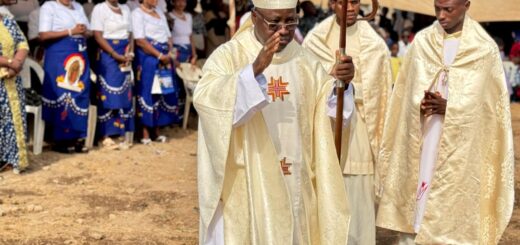Reflecting on sacrificial leadership with Jesus
by ARCH BISHOP · October 17, 2021
TWENTY NINTH SUNDAY IN ORDINARY TIME, YEAR B, OCTOBER 17, 2021, ST. LUKE’S PARISH, KUBWA, HOMILY BY ARCHBISHOP I. A. KAIGAMA
READINGS: Is. 53: 10-11; Ps. 32 (33): 4-5, 18-22; Heb. 4: 14-16; Mk. 10: 35-45
Peace and blessings upon you Fr. Innocent Jooji, your team of collaborators, the 169 candidates for confirmation, and indeed, all the parishioners of St. Luke’s Parish, Kubwa.
This Sunday, your parish celebrates in anticipation, the feast of St Luke, your patron Saint. Happy feast day to you all!
St. Luke was an author; a preacher and also a medical doctor (cf. Col. 4:14). In his Gospel he tells the beautiful stories about Jesus, not in abstract or philosophical terms but in a manner that is down to earth to help his readers to advance in faith and good works. The stories in Luke’s Gospel focus on the faith that should lead to social action in favour of the poor, the sick, the outcasts, the oppressed, sinners or those suffering social and economic injustice. As the author of Acts of the Apostles, he describes the early events in the Church.
The readings of today urge us to reflect on the theme of sacrificial leadership with Jesus as the model par excellence. Whether in the Church or in the civil society, sacrificial leadership can qualify us for a place in the kingdom of God.
We read in the Synoptic Gospels the devil tempting Jesus to seek pleasure by turning stones into bread and to acquire power and its glory by worshiping him. Jesus refused the devil’s suggestions in order to remain God’s Holy One. He chose the path of suffering, and by His suffering He justified many, taking their faults on Himself (cf. Is. 53:11).
The second reading shows Jesus as the High Priest who is able to sympathize with us in our weaknesses. For us, He emptied Himself to take the form of a servant (cf. Phil. 2:6-8).
In the Gospel, the Zebedee brothers, James and John, trying to upstage the other disciples asked to be given the two most important places of honour when Jesus enters into His glory. They shared in the prevailing ignorance that Jesus came as a political messiah, a revolutionary who sitting on David’s throne would reign over a united Israel. They thought that Jesus’ final journey to Jerusalem was to overthrow the Romans, and they wanted an assurance from Jesus that they would secure positions of command in the coming kingdom. This erroneous expectation resulted perhaps from their misunderstanding of Jesus’ teaching about the kingdom described in very enticing terms as a mustard seed that grows into a tree, and birds come and make nest in its branches (cf. Mt. 13:31-32); a treasure hidden in a field (cf. Mt 13:44); a pearl of great value (cf. Mt 13:45-46). No wonder, James and John wanted a share of choice places in the glory and beauty of that kingdom (cf. Mk. 10:37). They did not realize as many African leaders do today that true leadership is not about the position one occupies but how one serves. Before elections, politicians will swear, promising heaven and earth to share in the social concerns of their people, but after having won, they see the people’s complaints for an improved life as a nuisance. They are unwilling to drink from the cup of suffering the people are drinking.
With the image of the cup, Jesus assured the apostles that as leaders they would fully partake in His baptism of suffering and endure trials for the sake of the Gospel. James was later to preach the Gospel with such great courage and zeal that led to his beheading by Herod Agrippa (cf. Acts 12:2) and John suffered so much persecution that forced him into exile, giving credence to the saying that “no pain, no gain; no cross, no glory”.
James and John remind us of the attitude of people with an unbridled passion for power and wealth. As we approach the 2023 elections this reality is not far from us, where many will be driven by desperation to occupy juicy positions of leadership. Power and honour in themselves are not evil, but could become a problem when we desire them in the wrong spirit. The eagerness of politicians to occupy strategic positions does not amount to the eagerness to serve the teeming youths, people with disabilities, widows, orphans, senior citizens, women discriminated against, children, etc., but to be served and to command power. Jesus calls us to do the opposite: ‘You know that among the pagans their so-called rulers lord it over them, and their great men make their authority felt. This is not to happen among you. No; anyone who wants to become great among you must be your servant’ (Mk. 10:42-44).
A good and commendable example of sensitivity to the people’s wish is the Senate rescinding its earlier decision against the electronic transmission of election results by the Independent National Electoral Commission, INEC, to ensure credible polls. Leaders must learn Jesus’ humility who washed the feet of His apostles (cf. Jn. 13:13-14), to wash the feet of those they serve without lording it over them by exercising authority in a tyrannical manner.
We must all shun the mentality of “not what you know but who you know”. This mentality of nepotism and favouritism has unfortunately become noticeable in appointments, recruitment and admission into important institutions, etc.
To make Nigeria better, and our religious practices relevant, we, who claim to be religious, must embrace the life of service in the spirit of truth and holiness, and learn to wash the feet of one another.
Lord Jesus, grant us such a spirit in Nigeria.




